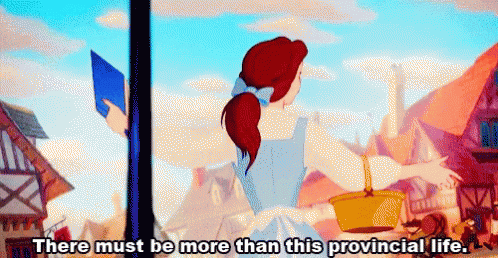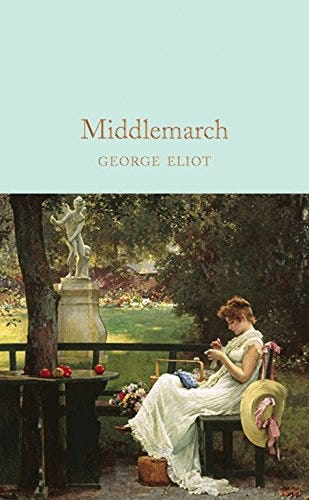What to Read Next (No. 241): This Provincial Life
Featuring "Middlemarch" and some Detective Gamache
Happy Friday, readers!
This week I finally took the time to jot down my thoughts on George Eliot’s 1871 classic Middlemarch, which I finished a couple months ago.
I’ve also been spending a lot of time in Three Pines, Quebec — the little off-the-map village that Louise Penny has created in her Armand Gamache detective series. (I read five of ‘em in August!)
As such, it’s been a very rural summer of reading. Naturally, I’ve been thinking of Belle’s famous line quite often:
Whereas Belle tries to escape her country upbringing by escaping into other worlds through books, the characters I’ve been reading about are firmly rooted in their provincial setting.
Let’s jump in. And as always, I’d love to hear what you’re reading!
Middlemarch by George Eliot
Middlemarch is one of those old, long, intimidating books that stares at you from the shelf, begging to be read, but is instead usually found gathering dust. And yet, people who have read Eliot’s classic have incredible, life-changing things to say about it.
In fact, three authors I’ve interviewed in this newsletter have mentioned Middlemarch in response to my question about the most impactful novels they’ve read:
Josh Ireland had this to say:
“I’m reasonably wary of the idea that literature should have a moral function, but I do think it can enlarge one’s capacity for empathy. George Eliot’s Middlemarch did that for me.”
Brad Stulberg included it among his favorite all-time novels:
“My two top novels of all time, for those with the time and energy: Middlemarch (Eliot) and War and Peace (Tolstoy) but those are less escape and more work, but my gosh are they good books that contain so much wisdom and truth.”
James Mustich, author of 1,000 Books to Read Before You Die, was just as effusive:
“I first read this when I was a sophomore in college, and I’ve returned to it regularly since, because what struck me as the wisest book I’d ever read at 19 not only remained so when I was 29, 39, 49, and 59, but seemed to increase in wisdom with each decade.”
So, of course I had to give Middlemarch a shot. I first tried reading it after interviewing Jim and couldn’t get past the first 30 pages or so (a few times). So I let it sit on my shelf for a couple years and was finally able to (slowly) get through all 900 pages this spring and summer.
The story centers on Dorothea Brooke and a rural cast of characters found in the sleepy fictional town of Middlemarch. Though there is more of a plot than I expected, it’s often relational in nature — Who does so-and-so end up with?! Will this couple make it?! Behind the story itself is a wise (if wordy) narrator, who offers up commentary on the character’s choices and attitudes.
The comments I quoted above about empathy and the incredible wisdom contained within Middlemarch’s pages are absolutely undeniable. The book is loaded with proverb-like lines regarding nearly every facet of life: work, romance, friendship, neighborliness — Middlemarch is brilliant in that way.
The problem is that those bits of wisdom are scattered across 900 pages of dense prose and dialogue. George Eliot just isn’t easy to read.
This is one of those classics for which I absolutely understand its importance in literary history and why it's endured, but honestly have a hard time recommending it. It’s length combined with its density makes for a tough experience. If you’re up for a challenge, you’re sure to be rewarded — but there are other big, old books that I’ve enjoyed far more, like War and Peace, Les Miserables, and anything by Charles Dickens.
That’ll do it for my hot take. I’d love to hear about your experience with Middlemarch if you’ve read it!
Still Life, A Fatal Grace, and The Cruelest Month by Louise Penny
Though I’ve already reviewed Still Life, the first three books in Louise Penny’s Armand Gamache series are worth looking at as a trio. They’re Penny’s earliest efforts as a full-time author and provide an early glimpse at the themes that have emerged as the series has grown.
The tricky part about any book series is that the author should provide enough info for a first-time reader to not feel lost, no matter where they start in the series. If you’re jumping in mid-way through a detective/mystery series, you’re obviously missing a lot of context, but each book should actually be able to stand on its own.
At the same time, you don’t want to include too much contextual material, which could annoy loyal chronological readers and make the story feel a bit bloated.
For whatever my opinion is worth (two cents, maybe?), I think Penny nails that balance.
To read the Gamache books in order — which I’m thoroughly enjoying doing — is to soak up all the background and to allow the stories to build on each other to create a fully built out universe. And yet, if you jump right into book #7, for example — which my wife did — it’s no less enjoyable. That’s a hard thing to accomplish.
This opening trio does also have a small three-book story arc which functions as a second plot line (besides the murder mystery at the center of each book). For regular readers, it’s nice to see some through-lines and connections; for first-time readers, those secondary plots might be missing some context, but aren’t the primary point of the novel anyway.
I’ve also really enjoyed seeing a few themes emerge that have become regular fixtures in her work (I’m now on book #7 myself):
deep empathy
a keen interest in the arts
as much focus on emotions and relationships as sheer deduction
the subtle power of earnestness (there’s very little sarcasm found in Penny’s characters, which is refreshing in our modern age)
Overall, I just can’t recommend this series enough if you’re at all into mysteries and crime reads. Keep an eye for Penny’s new book, coming in November, and don’t forget about the free Three Pines newsletter that I’ll be contributing to in a couple months.
Thanks so much for the time and inbox space! I deeply appreciate it.
-Jeremy







All right, I did it! I got Still Life from the library, and I think this is going to be my winters-in-Chicago-are-too-cold-I-will-stay-inside-forever winter reading series!
I absolutely loved Middlemarch and would recommend it to every lover of classic literature. It’s a serious commitment but there was a nugget of wisdom in almost every page. I also found Dorothea one of the most flawless literary heroines.